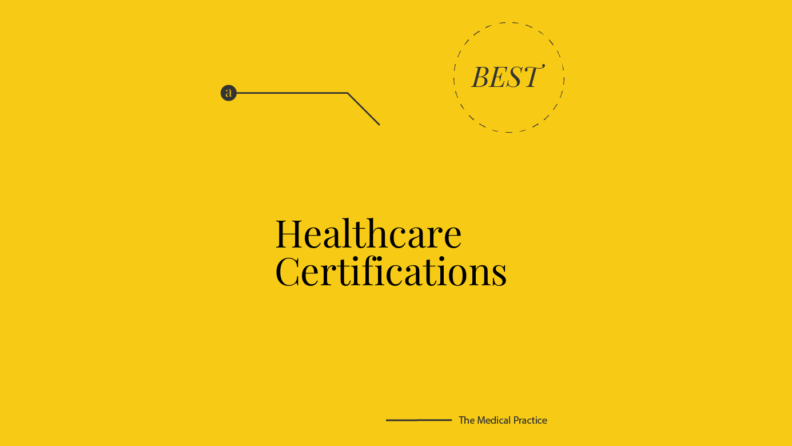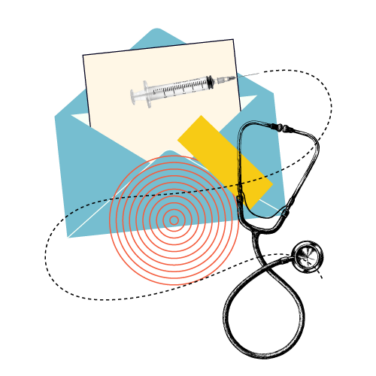By investing in the right certifications, you can tackle industry challenges and meet your practice's goals. This article will guide you through the best certifications available, detailing pricing, prerequisites, focus areas, and suitability.
Expect clear overviews to help you make informed decisions that align with your practice's needs and aspirations.
Best Healthcare Certifications Shortlist
Here's a shortlist of the best healthcare certifications I think are worth looking into:
- Certified Clinical Medical Assistant (CCMA) - Best for hands-on patient care
- Certified Patient Care Technician/Assistant (CPCT/A) - Best for patient support roles
- Certified Coding Specialist (CCS) - Best for advanced coding skills
- Certified Professional in Healthcare Risk Management (CPHRM) - Best for risk management expertise
- Certified Professional Coder (CPC)® Certification - Best for accurate medical coding
- Certified Billing & Coding Specialist (CBCS) - Best for billing and coding proficiency
- Certified Patient Care Technician Online CPCT Certification Exam - Best for online patient care certification
- Certified Phlebotomy Technician (CPT) - Best for phlebotomy expertise
- Online Apprentice Medical Scribe Professional Certification Course - Best for aspiring medical scribes
- Certified EKG Technician (CET) - Best for EKG proficiency
- Registered Health Information Technician (RHIT®) - Best for health information management
- Certified Pharmacy Technician (CPhT) - Best for pharmacy support roles
- Medical Billing and Coding Program - Best for comprehensive billing and coding
- NHA: Certified Clinical Medical Assistant (CCMA) - Best for NHA-certified patient care
Overviews Of The Best Healthcare Certifications
Below are my detailed summaries of the best healthcare certifications that made it onto my shortlist.
1. Certified Clinical Medical Assistant (CCMA) - Best for hands-on patient care
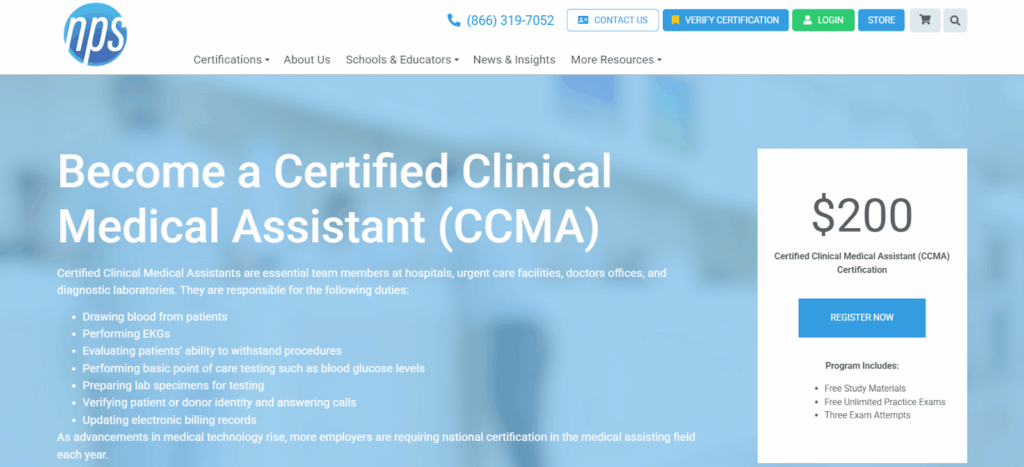
The Certified Clinical Medical Assistant (CCMA) certification validates your ability to perform essential clinical tasks in healthcare settings. It covers skills like patient care, medical procedures, and administrative support, ensuring you meet industry standards for medical assisting.
Issued by: National Performance Specialists (NPS)
Focus:
- Patient care procedures
- Medical terminology
- Phlebotomy and EKG basics
- Infection control
- Administrative tasks
Prerequisites:
- Education: Hold a high school diploma or an equivalent credential
- Work Experience: Must have one of the following:
- A. Complete at least 1 year of supervised experience within the past 3 years or 2 years within the past 5 years.
- B. Possess relevant work experience in a healthcare field applicable to the NPS certification.
- Exam: Yes
- Other Certifications: None required
Renewability: Yes
Price: $200
Who It’s For: Medical assistants, patient care technicians, and healthcare support staff seeking to enhance their clinical and administrative skills in various healthcare settings.
2. Certified Patient Care Technician/Assistant (CPCT/A) - Best for patient support roles
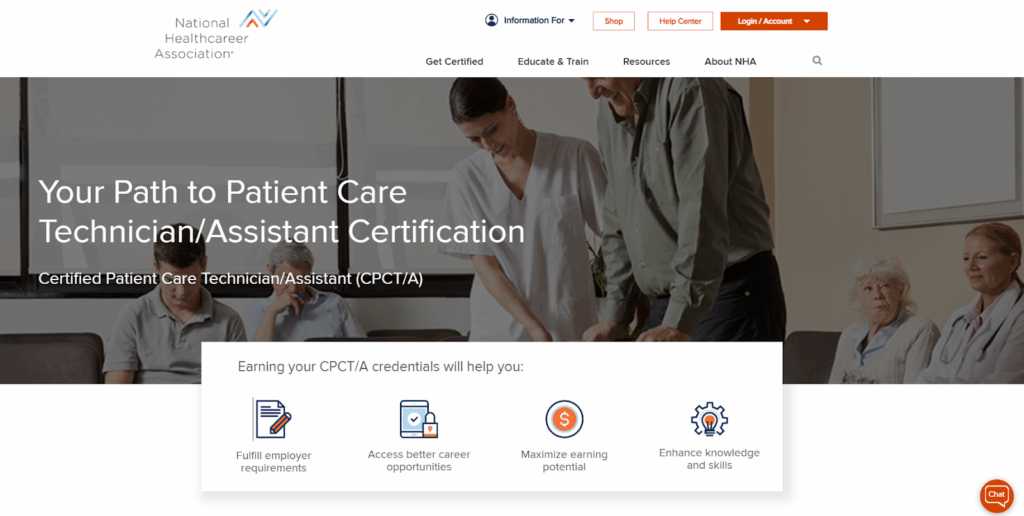
The Certified Patient Care Technician/Assistant (CPCT/A) certification validates your ability to assist with direct patient care in various healthcare settings. It covers essential clinical and technical skills needed to support medical teams and ensure patient well-being.
Issued by: National Healthcareer Association (NHA)
Focus:
- Basic patient care
- Phlebotomy and EKG procedures
- Mobility assistance
- Infection control
- Vital signs monitoring
Prerequisites:
- Education and Work Experience:
- Hold a high school diploma/GED in 12 months + completed a patient care technician program in the last 5 years or
- Hold a high school diploma/GED + 1 year of supervised patient care technician experience in the last 3 years or 2 years in the last 5 years.
- Exam: Yes
- Other Certifications: None required
Renewability: Yes, requires renewal every two years with 10 CEU credits and a recertification fee before expiration.
Who It’s For: Patient care technicians, nursing assistants, and other healthcare support professionals who provide direct patient care in hospitals, nursing homes, and other medical facilities.
3. Certified Coding Specialist (CCS) - Best for advanced coding skills
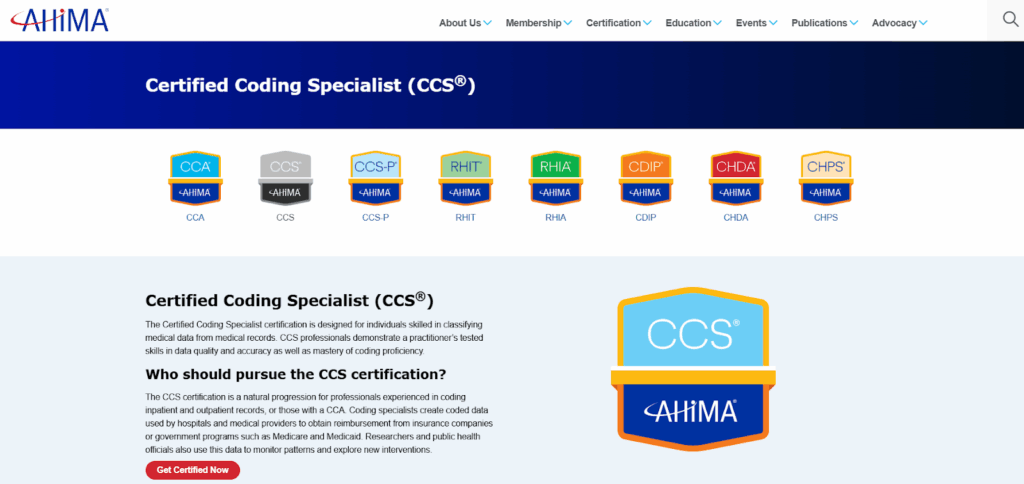
The CCS certification is for professionals adept at classifying medical data from patient records. It's tailored for those with experience in coding both inpatient and outpatient records. This credential signifies a mastery of coding proficiency.
Issued by: American Health Information Management Association (AHIMA)
Focus:
- Coding knowledge
- Documentation
- Provider queries
- Regulatory compliance
- Information technologies
Prerequisites:
- Education, Work Experience, and Other Certifications: Having at least one of the following is recommended, not required:
- Completion of courses in anatomy & physiology, pathophysiology, pharmacology, medical terminology, reimbursement methodology, ICD coding, and CPT/HCPCS, + 1 year of coding experience; OR
- At least 2 years of direct coding experience; OR
- CCA® credential with 1 year of coding experience; OR
- A coding credential from another certifying body with 1 year of coding experience; OR
- Possession of a CCS-P®, RHIT®, or RHIA® credential.
- Exam: Yes
Renewability: Yes, it requires CEUs and a recertification fee every 2 years.
Price:
- Member: $299
- Non-member: $399
Who It’s For: Medical coders, health information professionals, and coding auditors who specialize in accurately assigning diagnostic and procedural codes in hospitals and other healthcare settings.
4. Certified Professional in Healthcare Risk Management (CPHRM) - Best for risk management expertise
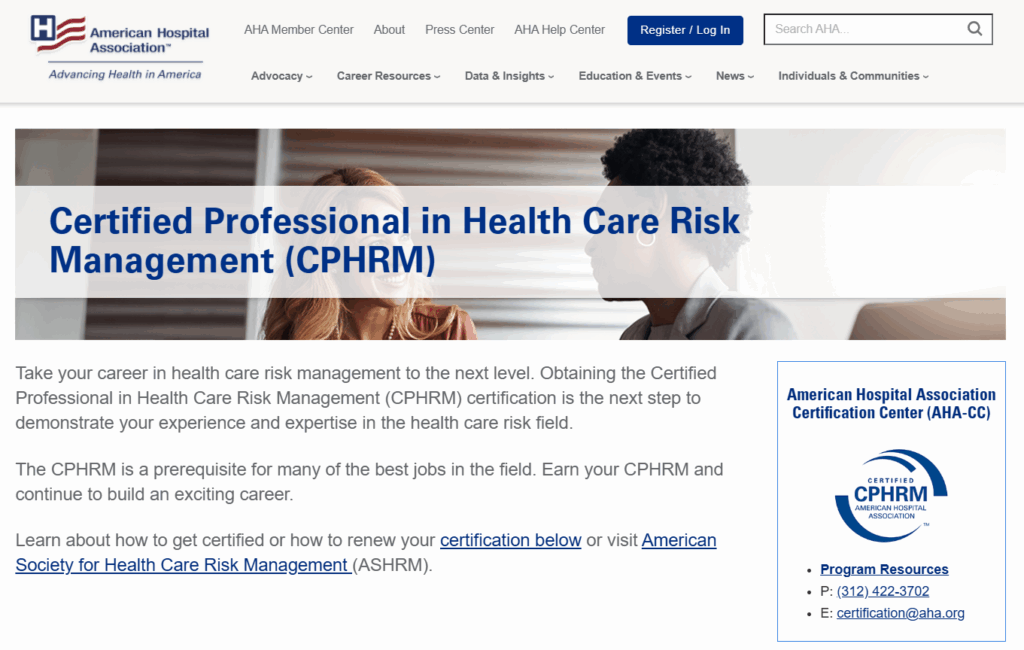
The Certified Professional in Healthcare Risk Management (CPHRM) certification demonstrates your knowledge of risk management principles in healthcare. It covers areas like patient safety, compliance, and financial risk, ensuring you can effectively mitigate risks in medical settings.
Issued by: American Hospital Association (AHA)
Focus:
- Risk assessment and mitigation
- Patient safety and compliance
- Healthcare regulations
- Financial and operational risks
- Crisis management
Prerequisites:
- Education and Work Experience: For Education/Health Care experience, it requires one of the following:
- Bachelor's or higher + 5 years in health care or related services
- Associate degree + 7 years in health care or related services
- High school diploma + 9 years in health care or related services
AND
- 3,000 hours or 50% of full-time duties in health care risk management within the last 3 years
- Exam: Yes
- Other Certifications: None required
Renewability: Yes
Price:
- Exam Fees:
- Members: $275
- Non-members: $425
- Renewal Fees:
- Members: $135
- Non-members: $225
Who It’s For: Healthcare risk managers, patient safety officers, compliance professionals, and other healthcare leaders responsible for managing risk, ensuring patient safety, and maintaining regulatory compliance in healthcare settings.
5. Certified Professional Coder (CPC)® Certification - Best for accurate medical coding

The Certified Professional Coder (CPC)® certification validates your ability to assign medical codes for diagnoses, procedures, and services in diverse settings across the healthcare industry. It ensures proficiency in CPT®, ICD-10-CM, and HCPCS Level II coding, helping maintain compliance and reimbursement accuracy.
Issued by: AAPC
Focus:
- CPT®, ICD-10-CM, and HCPCS coding
- Medical terminology and anatomy
- Healthcare regulations and compliance
- Insurance claim processing
- Reimbursement methodologies
Prerequisites:
- Education: No formal education requirements
- Work Experience: Training requires knowledge of medical terminology, anatomy, and pathophysiology.
- Exam: Yes
- Other Certifications: None required
Renewability: Yes, requires active AAPC membership and 36 CEUs every two years.
Price:
- CPC Exam: $399 (one attempt) or $499 (two attempts)
- Exam Prep Traning: $2,799
Who It’s For: Medical coders, billing specialists, and healthcare professionals who assign accurate medical codes for diagnoses, procedures, and services in outpatient settings such as physician offices and clinics.
6. Certified Billing & Coding Specialist (CBCS) - Best for billing and coding proficiency
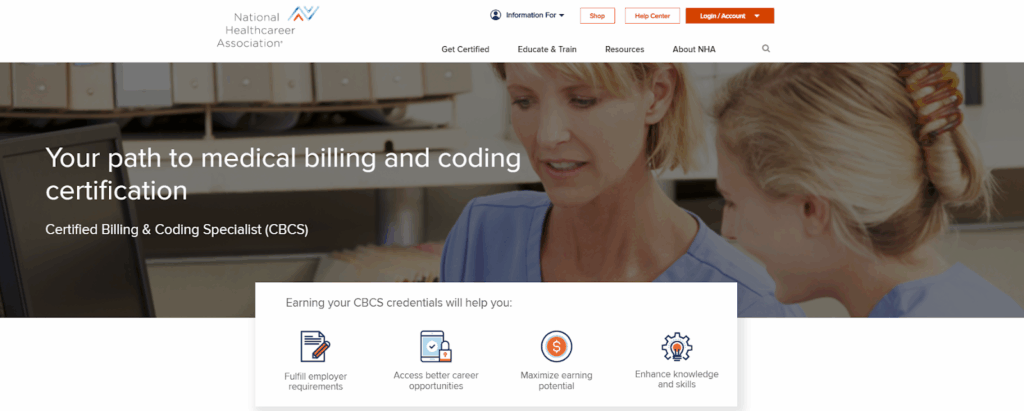
The Certified Billing & Coding Specialist (CBCS) certification validates your ability to manage medical billing and coding tasks, ensuring accuracy in insurance claims and reimbursements. It covers key coding systems, regulatory compliance, and claims processing to support healthcare revenue cycles.
Issued by: National Healthcareer Association (NHA)
Focus:
- Medical billing and coding
- Insurance claims processing
- Healthcare regulations and compliance
- Reimbursement procedures
- Patient data management
Prerequisites:
- Education and Work Experience:
- Hold a high school diploma/GED or earn one within 12 months + complete a medical billing and coding program within the last 5 years or
- Hold a high school diploma/GED + 1 year of supervised medical billing and coding experience in the last 3 years or 2 years in the last 5 years.
- Exam: Yes
- Other Certifications: None required
Renewability: Yes, every 2 years with 10 CE credits + fee.
Who It’s For: Medical billing and coding professionals who process healthcare claims, manage patient billing, and ensure accurate coding for insurance reimbursement in various healthcare settings.
7. Certified Patient Care Technician Online CPCT Certification Exam - Best for online patient care certification
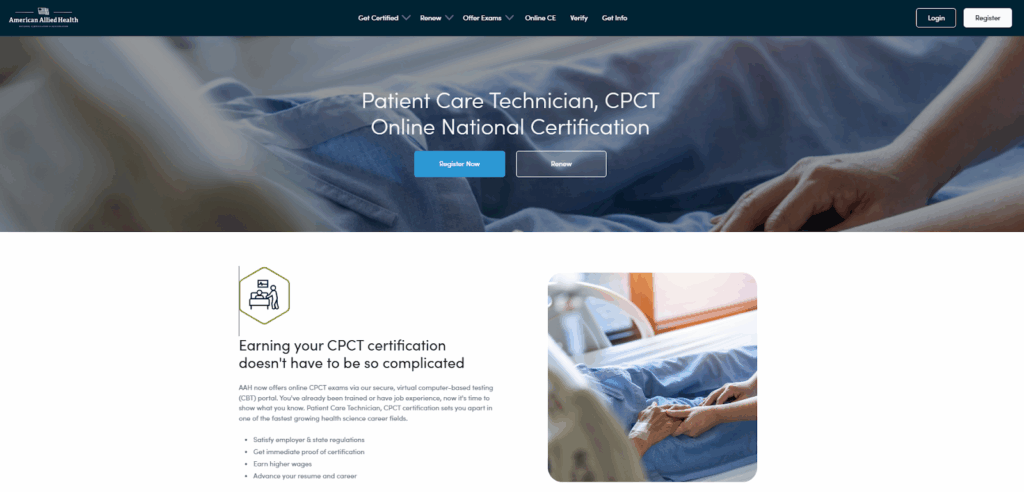
The Certified Patient Care Technician (CPCT) certification verifies your ability to assist in patient care, perform basic medical procedures, and support healthcare teams. It ensures competency in essential clinical and administrative tasks, meeting industry standards for patient care technicians.
Issued by: American Allied Health (AAH)
Focus:
- Basic patient care procedures
- Phlebotomy and EKG monitoring
- Vital signs measurement
- Infection control protocols
- Healthcare documentation
Prerequisites:
- Education: Complete a relevant course or training program + provide a transcript, diploma, or certificate.
- Work Experience Requirements: At least 1 year in the field + submit an employer letter, pay stub, or DD Form 214 (for military).
- Exam: Yes
- Other Certifications: None required
Renewability: Yes, requires annual continuing education (CE), earned through AAH account or external credits.
Who It’s For: Patient care technicians, nursing assistants, and other healthcare support professionals who assist with direct patient care, including monitoring vital signs, performing basic medical procedures, and providing support in hospitals, nursing homes, and other healthcare facilities.
8. Certified Phlebotomy Technician (CPT) - Best for phlebotomy expertise
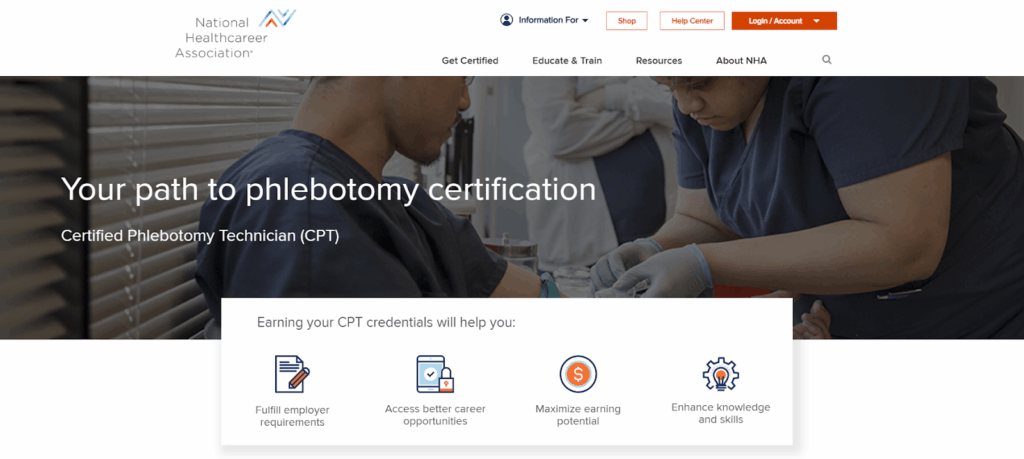
The Certified Phlebotomy Technician (CPT) certification validates your ability to perform blood draws, handle specimens, and follow proper safety procedures. It ensures competency in venipuncture techniques, patient interaction, and lab processing standards.
Issued by: National Healthcareer Association (NHA)
Focus:
- Venipuncture techniques
- Specimen collection and handling
- Patient safety and interaction
- Infection control procedures
- Laboratory processing
Prerequisites:
- Education and Work Experience: Must meet one of the following:
- Hold a high school diploma/GED or earn one within 12 months + complete a phlebotomy technician program in the last 5 years + provide proof of 30 venipunctures and 10 capillary/finger sticks or
- Hold a high school diploma/GED + 1 year of supervised phlebotomy experience in the last 3 years or 2 years in the last 5 years + provide proof of 30 venipunctures and 10 capillary/finger sticks on live individuals.
- Exam: Yes
- Other Certifications: None required
Renewability: Yes, with completion of 10 CEU credits and a certification fee every two years.
Who It’s For: Designed for phlebotomists, medical assistants, and other healthcare professionals who collect blood specimens, process lab samples, and ensure patient safety in hospitals, clinics, and diagnostic laboratories.
9. Online Apprentice Medical Scribe Professional Certification Course - Best for aspiring medical scribes
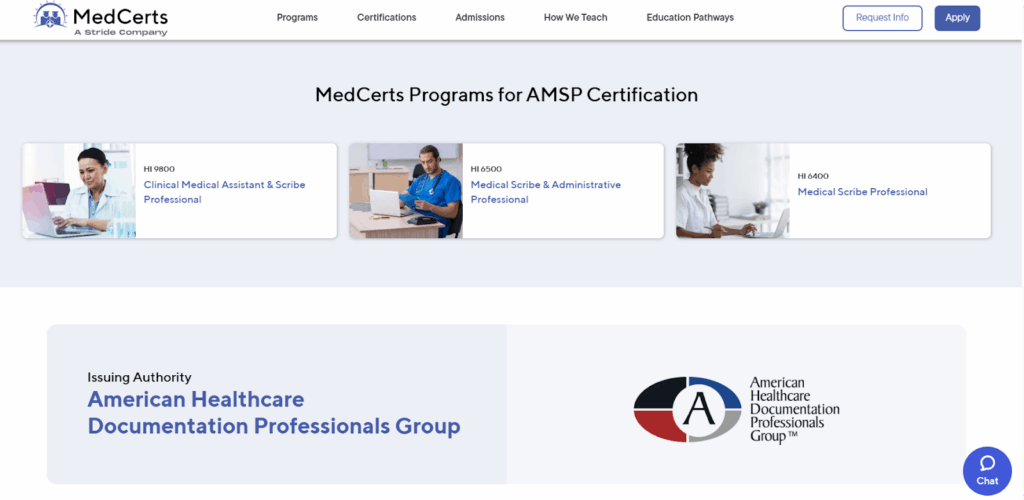
The Online Apprentice Medical Scribe Professional Certification Course trains you to accurately document patient encounters, medical histories, and physician notes. It covers essential scribing techniques, medical terminology, and electronic health record (EHR) navigation.
Issued by: MedCerts
Focus:
- Medical documentation
- Electronic health records (EHR)
- Medical terminology
- Physician note-taking
- Healthcare workflow
Prerequisites:
- Education: No formal education requirements
- Work Experience: None required
- Exam: Yes
- Other Certifications: None required
Renewability: No
Price:
- Program and Tuition Costs:
- MedCerts: $4,000
- Community College: $20,000
- Online College: $3,000
- Exam Fees and Materials: $750 (community college and online college)
Who It’s For: Aspiring medical scribes who assist healthcare providers by documenting patient encounters, managing electronic health records (EHRs), and improving clinical workflow efficiency in medical settings.
10. Certified EKG Technician (CET) - Best for EKG proficiency
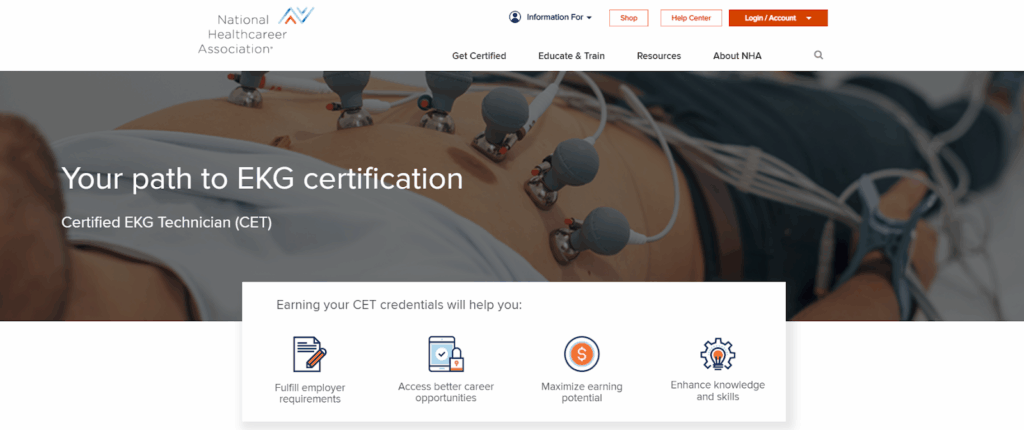
The Certified EKG Technician (CET) certification confirms your ability to perform electrocardiograms, monitor heart rhythms, and assist with cardiovascular procedures. It ensures you can operate EKG equipment, interpret basic readings, and follow safety protocols in clinical settings.
Issued by: National Healthcareer Association (NHA)
Focus:
- EKG equipment operation
- Heart rhythm interpretation
- Patient preparation and safety
- Electrode placement
- Cardiac emergency response
Prerequisites:
- Education and Work Experience: Must meet one of the following:
- Hold a high school diploma/GED or earn one within 12 months + complete an EKG technician program in the last 5 years + provide proof of performing 10 EKGs on live individuals or
- Hold a high school diploma/GED + 1 year of supervised EKG technician experience in the last 3 years or 2 years in the last 5 years + provide proof of performing the required number of EKGs on live individuals.
- Exam: Yes
- Other Certifications: None required
Renewability: Yes, every two years.
Who It’s For: Ideal for medical assistants, nurses, and technicians in hospitals, clinics, and diagnostic labs.
11. Registered Health Information Technician (RHIT®) - Best for health information management
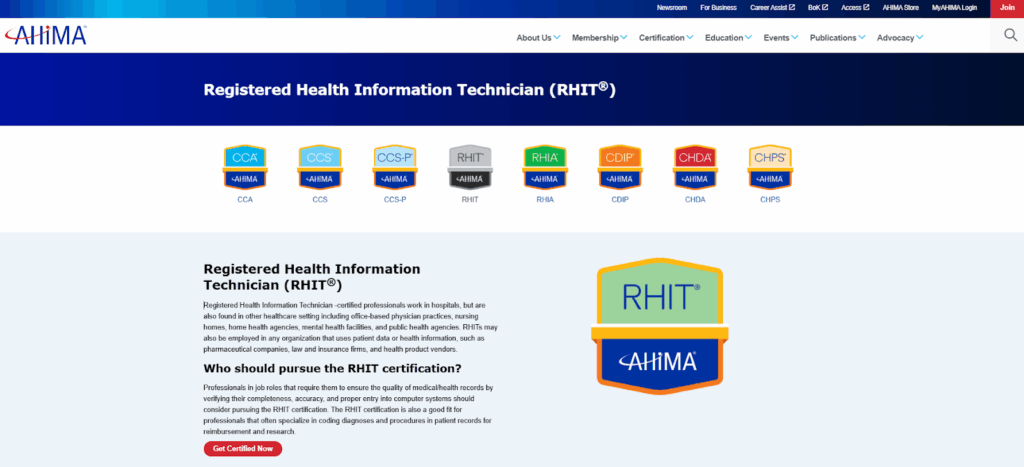
The RHIT certification ensures professionals are competent in health informatics and information management. It focuses on maintaining the quality of medical records and using technology to enhance patient care and streamline operations.
Issued by: American Health Information Management Association (AHIMA)
Focus:
- Quality of medical records
- Health informatics
- Data accuracy
- Patient care improvement
Prerequisites:
- Education: Must meet one of the following:
- Possesses an associate degree from a Health Information Management (HIM) program accredited by the Commission on Accreditation for Health Informatics and Information Management Education (CAHIIM); or
- Complete an HIM program recognized by a foreign association that has a reciprocity agreement with AHIMA.
- Work Experience: None required
- Exam: Yes
- Other Certifications: None required
Renewability: Yes, it requires recertification every two years with completed CEUs and a recertification fee.
Price:
- Member: $229
- Non-member: $299
Who It’s For: Health information professionals who manage medical records, ensure data accuracy, and oversee health information systems in hospitals, clinics, and other healthcare facilities.
12. Certified Pharmacy Technician (CPhT) - Best for pharmacy support roles
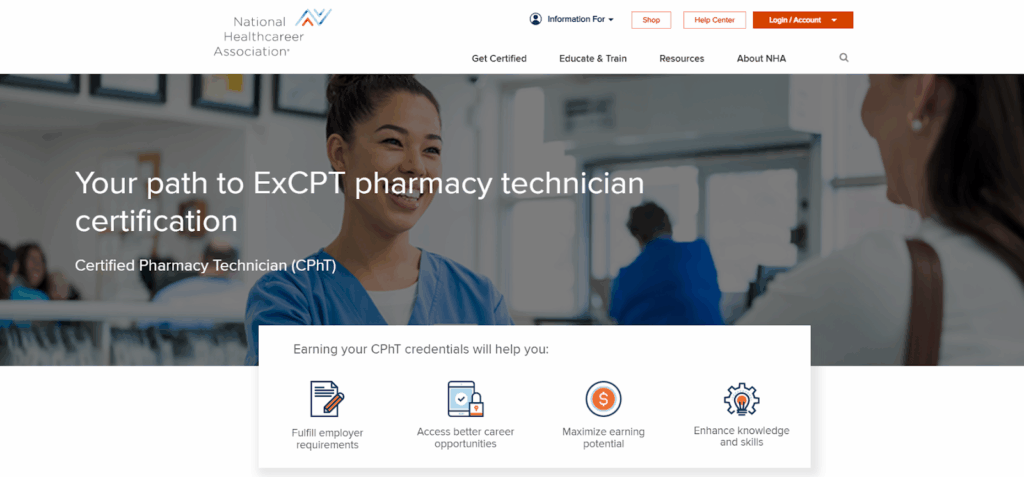
The Certified Pharmacy Technician (CPhT) certification confirms your ability to assist pharmacists in preparing and dispensing medications. It covers essential tasks like medication safety, prescription processing, and inventory management to ensure efficient pharmacy operations.
Issued by: National Healthcareer Association (NHA)
Focus:
- Prescription processing
- Medication safety and regulations
- Pharmacy calculations
- Inventory management
- Customer service in pharmacies
Prerequisites:
- Education and Work Experience: Must possess one of the following:
- Hold a high school diploma/GED or earn one within 60 days + complete a pharmacy technician training or education program in the last 5 years or
- Hold a high school diploma/GED + 1 year of pharmacy-related work experience with at least 1,200 supervised hours in the last 3 years.
Exam: Yes
- Other Certifications: None required
Renewability: Yes, every two years.
Who It’s For: Pharmacy technicians who assist pharmacists in preparing medications, managing inventory, processing prescriptions, and ensuring accurate pharmaceutical care in retail, hospital, and clinical pharmacy settings.
13. Medical Billing and Coding Program - Best for comprehensive billing and coding
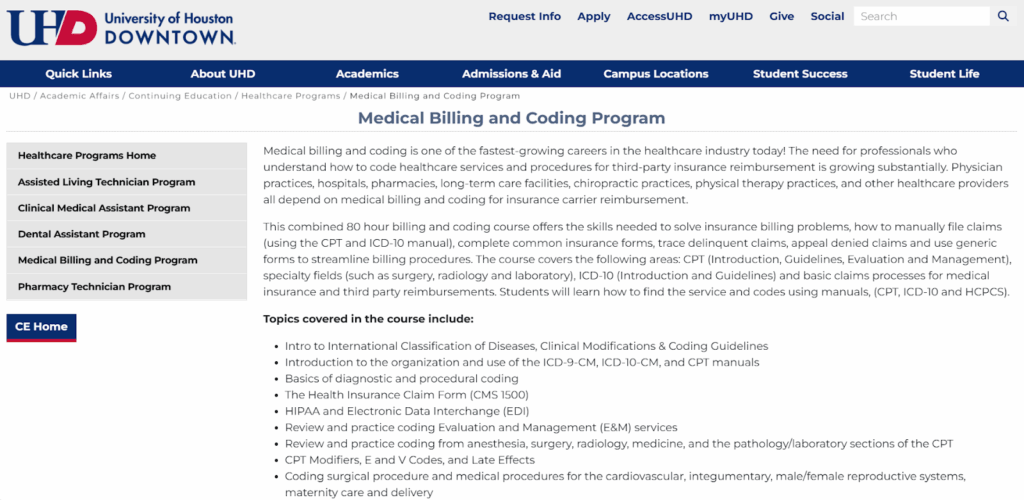
The Medical Billing and Coding Program provides training in medical coding systems, insurance processing, and healthcare reimbursement. It equips you with the skills needed to accurately code patient records, manage claims, and ensure compliance with industry regulations.
Issued by: University of Houston-Downtown (UHD)
Focus:
- Medical coding systems
- Insurance claim processing
- Healthcare compliance and regulations
- Reimbursement procedures
- Patient data management
Prerequisites:
- Education: High school diploma or GED
- Work Experience: 6 months to 2 years practical work experience
- Exam: Yes
- Other Certifications: None required
Renewability: No
Price: Starts at $1,699 - $1,899
Who It’s For: Individuals seeking careers in healthcare administration, focusing on processing insurance claims, coding medical procedures, and managing patient billing in hospitals, clinics, and insurance companies.
14. NHA: Certified Clinical Medical Assistant (CCMA) - Best for NHA-certified patient care
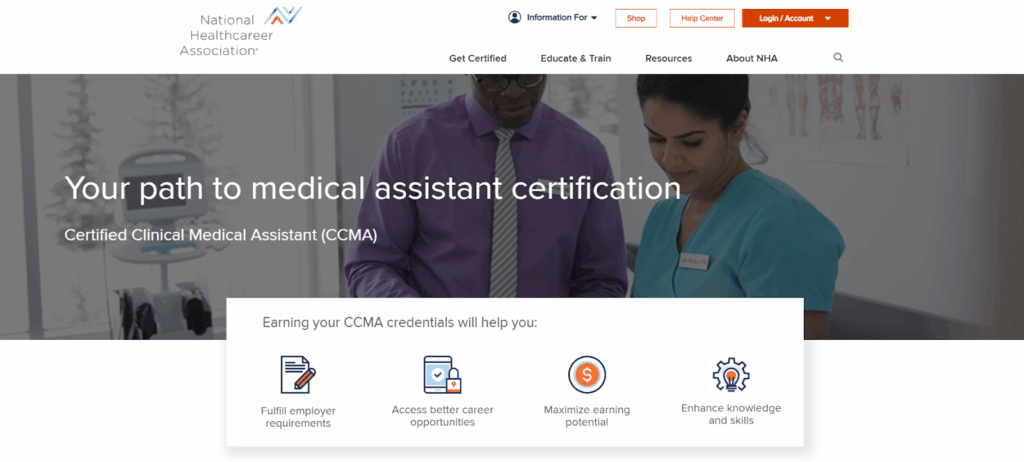
The NHA: Certified Clinical Medical Assistant (CCMA) certification confirms your ability to perform both clinical and administrative tasks in healthcare settings. It ensures proficiency in patient care, medical procedures, and office management to support physicians and healthcare teams.
Issued by: National Healthcareer Association (NHA)
Focus:
- Patient care procedures
- Medical office administration
- Phlebotomy and EKG basics
- Infection control protocols
- Vital signs monitoring
Prerequisites:
- Education and Work Experience: Must meet one of the following:
- Hold a high school diploma/GED or earn one within 12 months + complete a medical assistant training or education program in the last 5 years or
- Hold a high school diploma/GED + 1 year of supervised medical assisting experience in the last 3 years or 2 years in the last 5 years.
- Exam: Yes
- Other Certifications: None required
Renewability: Yes, every two years and requires to complete 10 CEU credits and a recertification fee before the expiration date.
Who It’s For: Medical assistants who perform clinical and administrative tasks, such as patient care, phlebotomy, EKGs, and medical office management, in outpatient settings like physician offices and clinics.
FAQs About Healthcare Certifications
What are the benefits of obtaining a healthcare certification?
Healthcare certification programs show your expertise and dedication to your field. They can open doors to better job opportunities, career advancement, and higher pay. With a certification, you demonstrate to your team and employers that you're committed to maintaining high standards in your work.
How do I choose the right certification for my practice?
Consider your practice's goals and the areas where you want to focus your professional development. Look at what skills or specializations are in demand and align with your team's strengths. Research various certifications, focusing on their prerequisites, costs, and renewal requirements. Make sure the certification aligns with your practice's needs.
How often do I need to renew a healthcare certification?
Renewal requirements vary by the medical certification in question. Some need renewal every year, while others might be every two or three years. Check the specific certification's guidelines. Staying current ensures your skills are up-to-date and relevant for any healthcare career in the medical field.
Other Useful Resources
Here are a few other useful resources to check out:
- Best healthcare administration books
- Best healthcare tech certifications
- Best healthcare leadership courses
What's Next?
To stay updated on the latest trends, best practices, and solutions related to your medical practice, subscribe to The Medical Practice newsletter.


